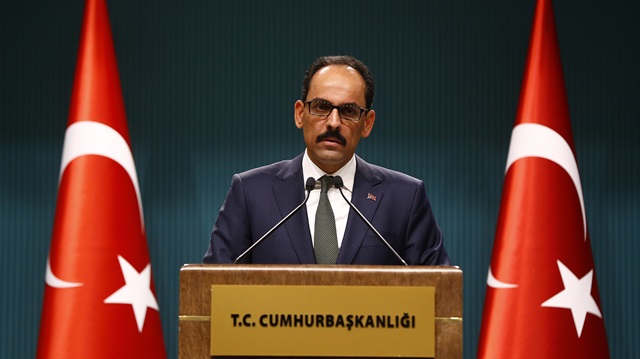
No one in Washington wants to ask who will stop released terrorists from becoming next suicide bombers, says Ibrahim Kalın
President Tayyip Recep Erdoğan’s aide on Friday criticized the U.S. over a deal between PKK/PYD and Daesh terrorist groups.
The recent deal allowed hundreds of Daesh terrorists to escape besieged Syrian city of Raqqah. BBC reported last Monday that a huge convoy consisting of around 50 trucks, 13 buses and more than 100 Daesh vehicles left Raqqah for Daesh-controlled territory to the southeast.
“The disturbing question no one in Washington wants to ask is who will stop these released terrorists from becoming the next suicide bombers in a major world capital,” Ibrahim Kalın, presidential aide, wrote on Friday.
Kalın, who is also President Recep Tayyip Erdoğan’s spokesman, expressed his views in a column, headlined “Syria: What is next?”
“The details of the deal they struck to let hundreds of Daesh terrorists out of Raqqa show once again the utter poverty of the policy of having one terrorist organization fight another,” Kalın said.
The PYD and its military YPG wing are Syrian branches of the PKK, which has waged war against Turkey for more than 30 years.
Since the PKK launched its terror campaign in Turkey in 1984, tens of thousands of people have been killed, including more than 1,200 since July 2015 alone.
The U.S. and the coalition have largely ignored the PYD/PYG links to the PKK, which the U.S., EU, and Turkey list as a terrorist group.
Kalın also emphasized that Syria should not have a place for the Assad regime in the future.
“As far as Russians and Iranians are concerned, they should realize that keeping Assad in power is not the way to protect their interests in Syria”, Kalın said.
He added that these issues will be addressed on Wednesday at a trilateral summit of presidents Recep Tayyip Erdoğan, Vladimir Putin and Hassan Rouhani in Russia’s Sochi as an extension of Astana talks.
Turkey and Russia, together with Iran, are the guarantor countries who brokered a cease-fire in Syria in December 2016 leading to the Astana, Kazakhstan talks, which are being held in parallel to UN-backed discussions in Geneva to find a political solution to the six-year conflict.
The eighth round of Astana talks is expected to be held in the second half of December.



